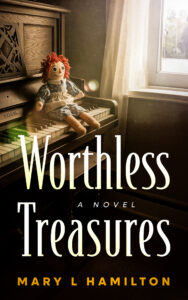Cleaning out the home of a loved one who has passed away is never easy. Besides coping with the grief, there are hundreds of decisions on what to keep, what to give away, and what to dispose of. Too often, guilt accompanies those decisions.
When my mother died, she left a house so cluttered it took the efforts of six siblings more than a year to clean it out. Later, when my in-laws passed away within two weeks of each other, my father-in-law had done a good job of organizing and leaving instructions for what was left behind. Yet we still found many of the items he’d kept held no meaning or attachment for us.
As I watched friends going through the same experiences, I couldn’t help but wonder what possessions I valued that wouldn’t hold the same importance for my children. The fine china table settings chosen by every bride in my generation have little place in today’s popular casual dining. The clothes my grandmother sewed for my Barbie doll won’t carry the same sentimental value for my granddaughters who never knew Grandma Rose. And the sleepy-eyed stuffed dog I received for my fifth birthday (that now rivals the velveteen rabbit for being loved) will likely be ignored in favor of newer stuffed animals that still sport their soft, clean fur.
While we in the Baby Boomer generation enjoyed collecting and acquiring possessions, today’s younger generations prefer to travel lighter. And what held so much importance for us generally has no value among our children and grandchildren.
Thinking of this made me wonder what I’d want my children to keep when I’m gone. If I could only ask them to keep five items, what would I include? My mother’s silver tableware? My dad’s Bible from his confirmation? My grandmother’s treadle sewing machine? Maybe something more personal, like my high school scrapbook, or a favorite necklace, or even my wedding dress?
That question sparked the idea for my latest book, Worthless Treasures, where Diamond Lange must dig through her late mother’s cluttered house for the five items she promised to pass on to others who would treasure them as her mom did. But Diamond sees no value in a piano that will always be out of tune, or a doll that’s lost half its hair, or any of the other things on her mother’s list.
For research, I interviewed a local woman who owns and operates a professional cleaning and organizing business. She confirmed my story’s premise that what one generation values rarely holds meaning for the next generation. She described one client whose mother told her she could never get rid of a certain piece of furniture. The client hated the item. It didn’t fit with any of her other decor, but even after her mother passed away and would never know it was gone, she felt compelled to keep it. Another family kept a long hair braid that allegedly belonged to a distant ancestor.
Years ago, I regarded my mom as silly for buying some little memento from a favorite store that was going out of business. But my interviewee explained that we do things like that to help us remember places, people, and events that are important to us. It’s the reason we buy souvenirs when we travel. We don’t trust our memory to hold onto those special times and places, so we buy trinkets to remind us.
To me, the store my mother didn’t want to forget was merely the place we took our photo film for developing. But later, I realized the store was primarily a gift shop featuring Norwegian-themed merchandise. My mother’s maternal family were immigrants from Norway. In fact, my mom was held back a year in school until she learned enough English. That store represented a connection to Mom’s past, her family or origin. The trinket she bought was a memory-keeper.
Like Diamond, I learned that worth isn’t always measured in dollars and cents. Sometimes it’s measured in the heart. And that’s such a comfort when we remember that God doesn’t value our outward appearance. He measures our worth in the depths of His heart.
 The death of her mother leaves Diamond Lange with a short list of items she must pass on to others who will treasure them as her mother did. But as she digs through her mother’s cluttered house to find them, she can’t imagine who would even accept a piano that will always be out of tune, a rag doll missing half its hair, or any other the other worthless things on the list? If she can find them all before the house is torn down for redevelopment, will they turn out to possess as little value as she believes? Or will she see their worth, and her own, through the eyes of those who receive them?
The death of her mother leaves Diamond Lange with a short list of items she must pass on to others who will treasure them as her mother did. But as she digs through her mother’s cluttered house to find them, she can’t imagine who would even accept a piano that will always be out of tune, a rag doll missing half its hair, or any other the other worthless things on the list? If she can find them all before the house is torn down for redevelopment, will they turn out to possess as little value as she believes? Or will she see their worth, and her own, through the eyes of those who receive them?
Amazon: https://www.amazon.com/dp/B0F4497KMT
Other retailers: https://books2read.com/u/b5GggO
 Texas author Mary L Hamilton writes contemporary stories rippled with faith. She finds inspiration in everyday life and writes about characters who wrestle with various aspects of faith. Mary and her husband have three grown children and three awesome grandsons.
Texas author Mary L Hamilton writes contemporary stories rippled with faith. She finds inspiration in everyday life and writes about characters who wrestle with various aspects of faith. Mary and her husband have three grown children and three awesome grandsons.
